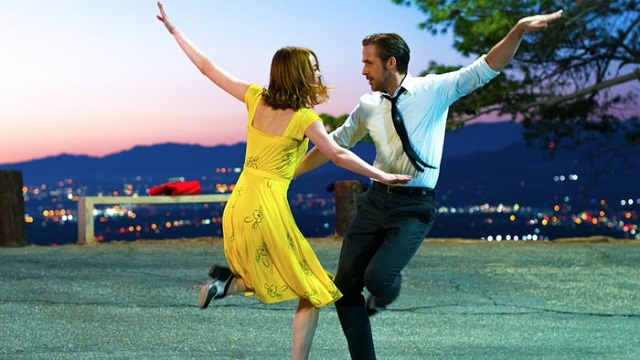Pop Stuff: On Loving ‘La La Land’
La La Land brings movie magic and pitch perfect optimism to an increasingly cynical climate

Emma Stone and Ryan Gosling in ‘La La Land.’ Photo: Dale Robinette
I’ve watched La La Land four times and I’m anticipating the fifth like a favorite bed time story, familiar yet full of anticipation, with a message that holds hopes and dreams so dear that a peaceful slumber is a sure thing. The last time I felt this way, I was eight years old, growing up at the glum end of the northern line in the often dreary London. Plagued by rainy days, frugal parents and an elder brother whose mission lay in provoking me to hysteria, I watched Mary Poppins endlessly, wishing for my own flying nanny to make each day just a little ”˜supercalifragilisticexpialidocious.’ Today, grown up, with grown up problems, in La La Land, a romantic musical the likes of which we haven’t seen since Gene Kelley was “Singing’ in the Rain,” I found the unexpected spoonful of sugar that makes the medicine go down.
The film is, at its core, a simple story. It follows an aspiring jazz musician and actress, played with the perfect dose of charm by Ryan Gosling and Emma Stone. Seb and Mia meet in Los Angeles and eventually face the predictable trade-off between love and ambition. La La Land packages this well-worn conflict between ideals and reality in a sun-soaked, toe-tapping, musical that stands apart from anything in recent cinema, and has stolen hearts, swept awards and is a shoe in for the Oscars. Superb acting, unforgettable tunes and a camera that bares the magic of the city, are topped by a remarkable honesty of emotion. Aspiring to live and love to the fullest is presented without the high drama that accompanies most storytelling. The bells and whistles are reserved for the musical interludes, so the story feels pitch perfect.
La La Land revels in fantasy. It opens with commuters bursting out of cars into song, while later its protagonists waltz in a starry sky as a prelude to their first kiss. Yet it feels wholly authentic because the optimism of the film is a resounding echo of its own journey. Director Damien Chazelle conceived the story while he was at Harvard along with classmate and La La Land composer Justin Hurwitz. He wrote the screenplay when the movie industry seemed out of reach, having just moved to Los Angeles. It was a salute to a city of dream chasers. Presented with a ”˜modern, original musical’ studios shut the door on an extinct genre. It was only after Hurwitz and Chazelle made Oscar nominated Whiplash, the semi-autobiographical story of a jazz drummer and his tyrannical teacher, that La La Land, borne of reaching for the stars, was greenlit.
In loving La La Land, I’m not simply celebrating original filmmaking or toasting the idealists. I, along with much of the movie going public, am responding to the times. The film unabashedly draws inspiration from the Golden Age of Hollywood musicals””films that emerged as an antidote to the Great Depression. Today, we are similarly hard pressed for a cheery moment. Knee-deep in demagoguery, war or crisis, struggling to separate fake news from real news, we agree that none of it is good news. Our entertainment whether destructive super hero fare, thought provoking drama or satirical comedy has eschewed happiness for cynicism and La La Land, while bitter sweet, is a beacon of light. We desperately need an excuse to break into song and fete the world in primary colours. La La Land is movie magic because above all else, it does just that.
Soleil Nathwani is a New York-based Culture Writer and Film Critic. A former Film Executive and Hedge Fund COO, Soleil hails from London and Mumbai.




